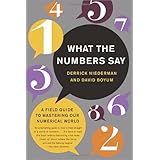
Average Reviews:

(More customer reviews)Are you looking to buy What the Numbers Say: A Field Guide to Mastering Our Numerical World? Here is the right place to find the great deals. we can offer discounts of up to 90% on What the Numbers Say: A Field Guide to Mastering Our Numerical World. Check out the link below:
>> Click Here to See Compare Prices and Get the Best Offers
What the Numbers Say: A Field Guide to Mastering Our Numerical World ReviewThis book offers examples of quantitative reasoning, including the topics of compound growth and statistics. Their perspective is that without the ability to work with numbers, people can easily be misled. One of the examples is a statistic used by defense attorney Alan Dershowitz to mislead the jurors in the infamous Simpson trial.As I was reading the book, I wondered who the audience ought to be. Although the tone is breezy and the examples are presented without the use of algebra or higher mathematics, I am not sure how a math-phobic person would react. My experience with math phobes is that they would feel threatened by the book and be resistant to picking it up.
A better audience for the book might be math educators. As a teacher, I found numerous examples in the book that will be helpful. Moreover, the last chapter, in which they discuss ways to reform math education, is a gem.
What the authors are saying is that people need good basic intuition about numbers in order to understand a world that is increasingly dominated by numerical data. The traditional math curriculum tries to prepare a student to study Newtonian physics. Instead, I think that the authors would argue that the curriculum ought to be aimed at enabling a student to understand stock market ratios and statistical research.
One random note is that the authors attribute the phrase "independence from irrelevant alternatives" to John Nash. I may be wrong, but I believe that it was Kenneth Arrow who brought that concept to the fore.
By filling the book with interesting examples that illustrate the type of quantitative reasoning that they consider important, the authors make a compelling case for the math education reform that they advocate. However, if their primary audience is math educators, that fact is obscured on the book jacket, which makes the intended audience unclear.What the Numbers Say: A Field Guide to Mastering Our Numerical World Overview
Want to learn more information about What the Numbers Say: A Field Guide to Mastering Our Numerical World?
>> Click Here to See All Customer Reviews & Ratings Now